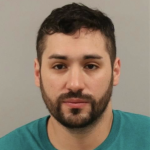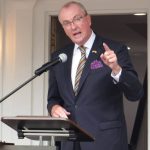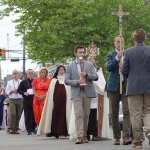July 4, our country’s birthday, is approaching and my thoughts turn to what it means to be American. Many times in the last few years we have wondered what it is to be an American and what our role is in contemporary society.
As an American Jew I feel especially grateful for this country that housed my family from oppression and protected us from the genocidal world outside our shores. In our love for our beautiful country we want to see it as perfect. It is sometimes hard to recognize aspects of her imperfections. I often wonder why I think this nation is great and for me it is because of our unresolved struggle for liberty.
When my father was very young his family moved to Texas in 1945. He remained there until he was 9 and then moved to Arizona. In my father’s life he saw so much change in this country.
My mother, born in St. Louis during World War II, still has one of her ration cards from when she was born that reveals the struggle that united the citizens of our country together to preserve liberty.
But there is also a dark revelation that comes in their early years. My parents both lived through the troubled times of the civil rights era and my father saw it firsthand in Texas in the early years of his life.
As I grew older and wanted to talk about the changes of that turbulent time, they would say that they were proud to have marched for civil rights and to see our country make the shift to equality for all. But my father never spoke of those early years in Texas when he was a child.
I tried many times to ask him about it, but he always would say “Jeff, I don’t want to talk about it.” I often wondered why until I read the following poem by Langston Hughes.
I, too, sing America.
I am the darker brother.
They send me to eat in the kitchen
When company comes,
But I laugh,
And eat well,
And grow strong.
Tomorrow,
I’ll be at the table
When company comes.
Nobody’ll dare
Say to me,
“Eat in the kitchen,”
Then.
Besides,
They’ll see how beautiful I am
And be ashamed—
I, too, am America.
I had always felt a little aura of superiority when I thought back to that conversation I had with my father so many years ago. Living in Texas in the 1950s was a world we could not comprehend today and thus I was very pleased with myself that my generation had passed this antiquated view of racial superiority and we now found it in our hearts to embrace all regardless of race.
But thoughts of my father start to creep up on me as our country is on the verge of embracing marriage equality for all. I have often thought of my own evolution on the subject of the humiliation and subjugation of our gay and lesbian brothers and sisters, and I have to recognize that I have been a part of this intolerance in the past.
Even though I have grown to accept and embrace marriage equality in our country, I recognize how humiliating it must have been for someone to grow up in my era of the early 1980s and the horrible treatment my generation had put on the LGBT community.
I grew up in Arizona in the 1980s, not a hot bed of gay tolerance, and I am ashamed of some of my views I held in my early childhood. I had a friend from high school who we used to give a hard time about his sexuality and he bravely came out in his twenties and successfully became mayor of Tempe, Ariz.
Now the only shock in our group about our friend is not that he is gay, but that he is a Republican, and serving proudly and openly in the Republican city council of Arizona. I often thought back to the many indignities he faced from us, in our ignorance and prejudice.
I wish I could have stood by him as he had the courage to come out to everyone he cared about and been embraced for the great person he is. But sadly, I was not there for him.
I now look at my own children and wonder what questions they will ask me when they are the same age I was when I asked my father. I would like to say to them I was brave and stood against the tide of popular opinion but I was not. I have been a supporter of marriage equality for over two decades but the fact I was not always is something I still feel shame about to this day.
Jewish law demands that faith and covenant be matched by something called Chok, or commitment, and thus at a Jewish marriage we not only profess love but also commitment by signing of the Ketubah or marriage contract.
Saying you love someone is meaningless without commitment and thus it says in our tradition that God and Israel became married under the Chupah (marriage canopy) of Sinai with the Torah being our Ketubah.
The brit or covenant that we declare as Jews promises not only love of God but commitment to walk in God’s ways and that is what makes our relationship unique.
There was a time when we would not accept those who loved another from a different race. I once asked my father how his generation could have been so closed minded, but now I realize as my sons Ari and Alex grow up they will look at me with the same question, also in the same amazement that my generation had difficulty embracing the love and desire of commitment to those of the same sex.
I see love as the ultimate embrace for all humanity and something we need to strive for in our life. The great sage, Hillel, was once asked to explain all Jewish teaching while standing on one foot. He responded kindly, “That which is hateful to you do not do to others, now go and learn.”
Another way to say that would be ‘do unto others as you’d have done to you.’ We need to embrace love in all aspects in our life and allow that love to flourish and grow to bring God into our world. To me that is the core of my faith, the rest is commentary.
The book of Corinthians, which is not a Jewish book, speaks of love in the highest level. I am not a Christian but I seek solace in this phrase as I think of the changing nature of our country and the mistakes I have made in the past which someday I will explain to my son.
I hope he recognizes the great words of so many religious traditions that ask us to always embrace love. “Love is patient, love is kind. It does not envy, it does not boast, it is not proud.” Love is forgiving and as we come to embrace the love of others it bleeds over into our love of God. I believe God would say to us ‘Look to love, the rest is commentary.’
Rabbi Jeffrey Lipschultz is the spiritual leader Beth Judah Temple in Wildwood, and July 7 begins leadership at the Tri City Jewish Center in Rock Island, Ill. He welcomes comments at dvjewish@rof.net







